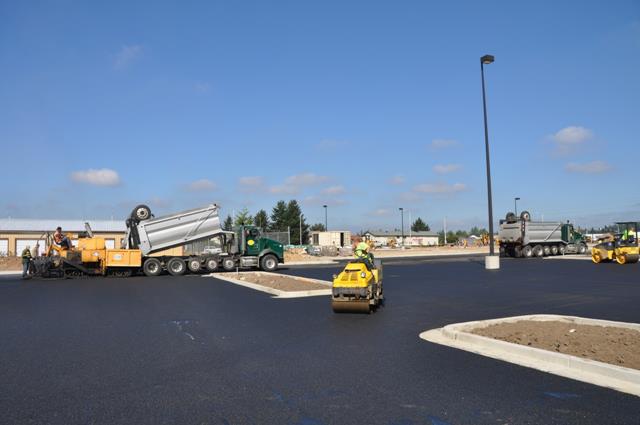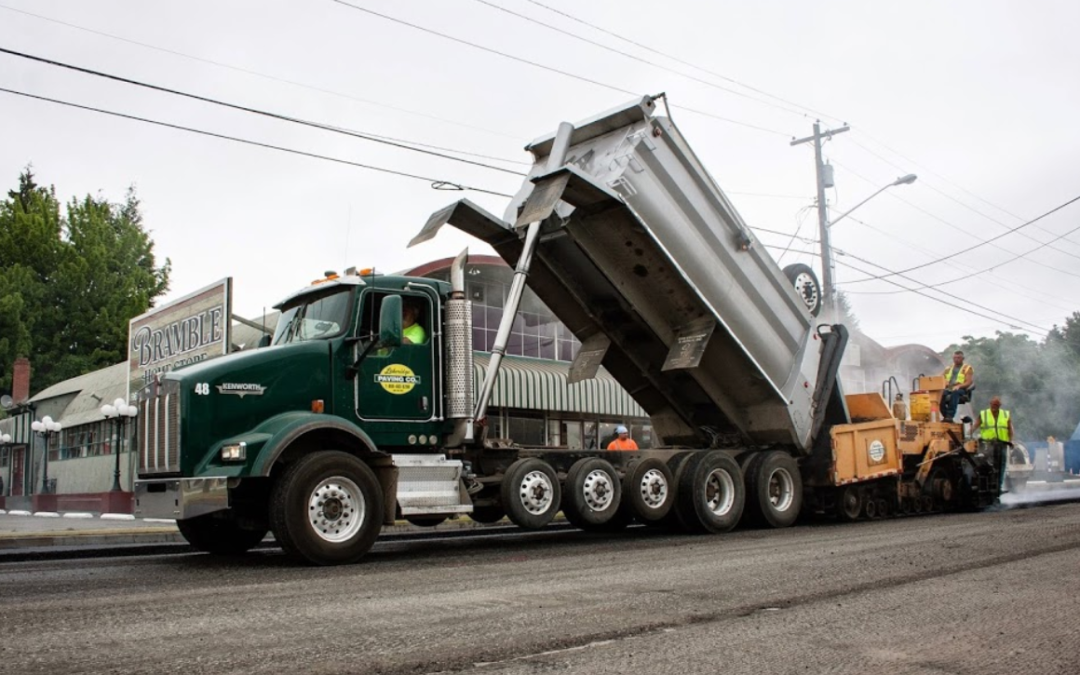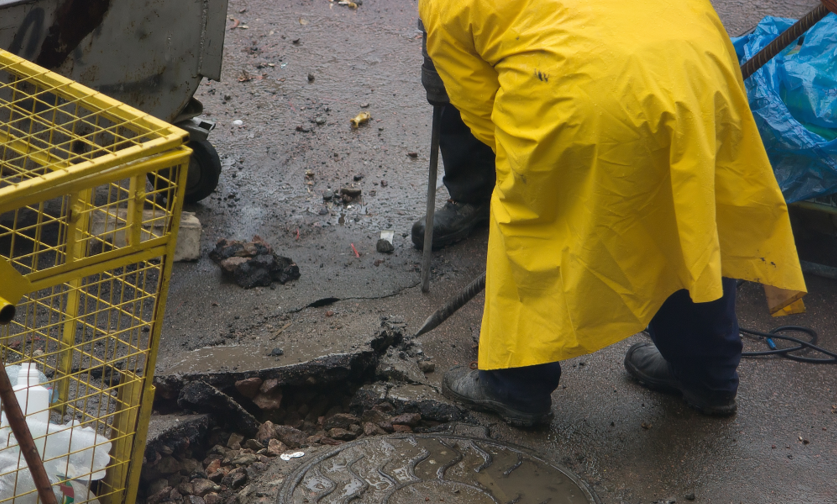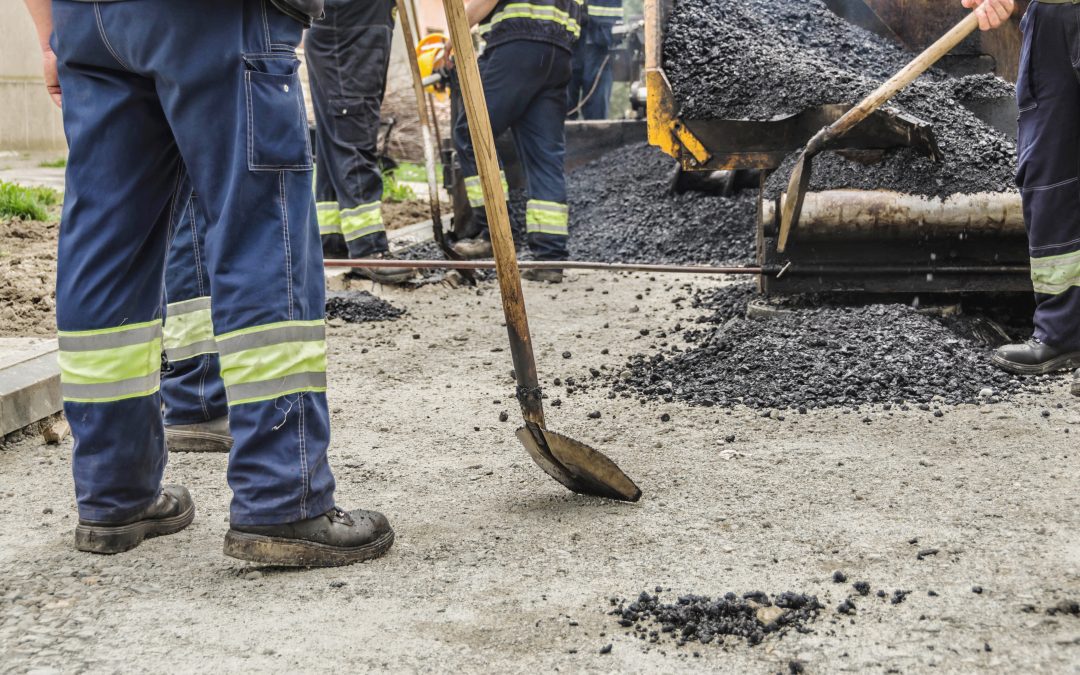
by lakeridge | Apr 1, 2019 | Commercial Paving
If your commercial parking lot is in need of repair, resurfacing or repaving, you may be wondering when the ideal time is to schedule the job. From a business perspective, it’s important to consider the impact a repaving project will have on your employees and customers. You ideally want to have the job performed at a time and on a schedule that will minimize disruption to your operations. There are other important factors to consider as well. In almost every case, warmer temperatures make for better asphalt paving conditions. Asphalt needs to be applied at high temperatures, and the asphalt mixture needs to maintain a high temperature while it’s being smoothed and compacted. Winter conditions can make doing this difficult, which can result in some asphalt companies leaving jobs with less than ideal results. For example, if the asphalt, delivered at 300-degrees Fahrenheit, is being applied 1.5 inches thick, and the surface temperature of the ground is only 40-degrees Fahrenheit, the asphalt contractors would only have about 16 minutes to compact the asphalt before it cools below approximately 175-degrees Fahrenheit, the point where it is no longer adequately malleable to finish the job properly. However, if the surface temperature were 80-degrees Fahrenheit those same asphalt contractors would have 24 minutes to compact the asphalt.1 The thicker the asphalt being applied, the longer asphalt contractors have to complete compaction, as the asphalt mixture will retain heat longer. Businesses in the Puget Sound area also have to contend with frequent moisture, which can also have a negative impact on asphalt paving results. All that being said, an experienced asphalt paving company...

by lakeridge | Mar 7, 2019 | Commercial Paving
Property owners have a lot of options when it comes to addressing a failing asphalt parking lot or access roads. There are many potential solutions that can extend the working life of your existing parking lot, and many things to consider if complete replacement really is the best option. Questions to Ask Yourself Before a Commercial Paving Job Consider your business’s parking lot and any specifics needs or problems you currently have that should be addressed: Are there areas that tend to accumulate more standing water than others? Consider inspecting your paved areas after a rainstorm to identify areas that may have problematic draining. Does your current parking situation meet your needs? Lines can be adjusted to accommodate more vehicles or give vehicles more space in each spot. Do you have any problems with people speeding or driving recklessly in your parking lot? Having your property’s parking lot or driveways repaved is a good opportunity to add speedbumps or other traffic calming features. Do you have any major building construction projects coming up? It’s advisable to have construction or renovation projects completed first so construction vehicles don’t damage your newly paved commercial parking lot. When is the best time to have the job performed? Even if you decide to overhaul your existing parking lot, you’ll want to choose a time when the project will have minimal impact on your business’s operations. Is Repair an Option? There are some circumstances when it may make sense to have potholes professionally patched or cracks properly filled rather than pay for a larger-scale job. At Lakeridge Paving, we always encourage businesses with asphalt...

by lakeridge | Feb 5, 2019 | Commercial Paving
Most people probably don’t give airport paving much thought when they’re sitting in the terminal waiting for a flight. It’s one of the less thrilling aspects of an aviation industry that literally sends people soaring through the sky. But maybe we should be appreciating it more than we do, especially when taking into account just how integral they are to ensuring safe arrivals and departures. It’s pretty astonishing they seem to hold up as well as they do. Airports are one of the few places that don’t take any days off. Whether it’s Christmas Day, the middle of the night or raining cats and dogs, planes are still taking off and landing on the “tarmac.” Don’t Call Them Tarmacs in Front of an Enthusiast The folks at Aerosavvy really want you to know that “It’s NOT A Tarmac!” Tarmac is actually most commonly used as another term of asphalt. If you visit the United Kingdom you may notice people referring to what we commonly call asphalt as “tarmac.” If you really wanted to get technical about it, tarmac is its own separate paving method. Its full name is tarmacadam, which was named after John Loudon McAdam. He created a process known as “macadamizing,” wherein crushed gravel is applied to the surface of a paved road. The tarmac most people know today was actually patented by Edgar Purnell Hooley in 1901, although he didn’t really come up with the paving solution himself. Rather, he was driving past a tar factory and noticed that tar had been accidently spilled onto a “macadamized” road. Someone had covered that tar spill with more...

by lakeridge | Jan 16, 2019 | Commercial Paving, Residential Paving
Paving is one type of construction that can be significantly impacted by temperature. What tends to matter more than the actual ambient temperature is the ground temperature and moisture levels. Even if it’s 45 degrees outside in the morning, the ground itself is likely colder from the night before, and its important for the ground to be adequately warm to lay asphalt. Proper compaction requires the asphalt to remain above a certain temperature during the process. If the ground is too cold it will leach the heat out of the asphalt too quickly, which means it may settle before paving crews can finish compacting and smoothing it. Evaporating rainwater also has a cooling effect, which can result in similar complications if a job isn’t scheduled appropriately to minimize these issues. There are ways around low temperatures for small scale jobs, such as filling potholes. Asphalt pavers with infrared paving equipment can utilize heaters and hot boxes to keep the asphalt dry and maintain a suitable temperature throughout the job. This equipment generally can’t be used for larger jobs, like repaving a road or an entire parking lot, because the infrared asphalt heaters don’t cover a large enough area. How Cold Is Too Cold for Asphalt Paving in Seattle? The real issue with temperature is its impact on our ability to properly compact the asphalt before it cools too much. As a rule of thumb a thin, 1.5-inch layer of asphalt needs to be entirely compacted within 16 minutes of its application if the ambient temperature is in the 40 to 45-degree Fahrenheit range. When hot mix asphalt is delivered...
by lakeridge | Jun 21, 2018 | Commercial Paving
...

by lakeridge | Jun 21, 2018 | Commercial Paving, Residential Paving
When you’re driving down the highway, you don’t often think about the smooth, durable black stuff underneath your tires. It turns out, there’s a lot more to asphalt pavement than meets the eye. For instance, it’s one of the most widely-used materials in the country – more than 94 percent of American roads are paved with asphalt – and there are many types that cater to different situations.1 If you plan to take on a pavement project such as resurfacing a driveway, review these different types of asphalt so you can be sure you’re getting the best product for the road ahead. Porous Asphalt Porous asphalt is often used to pave parking lots because it reduces standing water after a heavy rainstorm. This style of asphalt is ideal for rainy spots, like the Puget Sound area. When storm water pools on an asphalt surface, it can cause defects, such as potholes, which are dangerous for vehicles and pedestrians. Porous asphalt combats pot holes and other defects by giving standing water a place to go. A layer of permeable asphalt is placed over a reservoir of open-graded stone. Storm water travels through the pavement, into the stone bed and eventually infiltrates the soil. When properly maintained, porous asphalt can last 20 years or more.2 Quiet Pavement Just as its name suggests, quiet pavement is a type of asphalt that reduces traffic noise. Paving a noisy road with a stone-matrix asphalt or open-grade friction has shown to reduce noise levels by up to seven decibels. According to the Asphalt Pavement Alliance, reducing noise levels by even just three decibels is equivalent...







